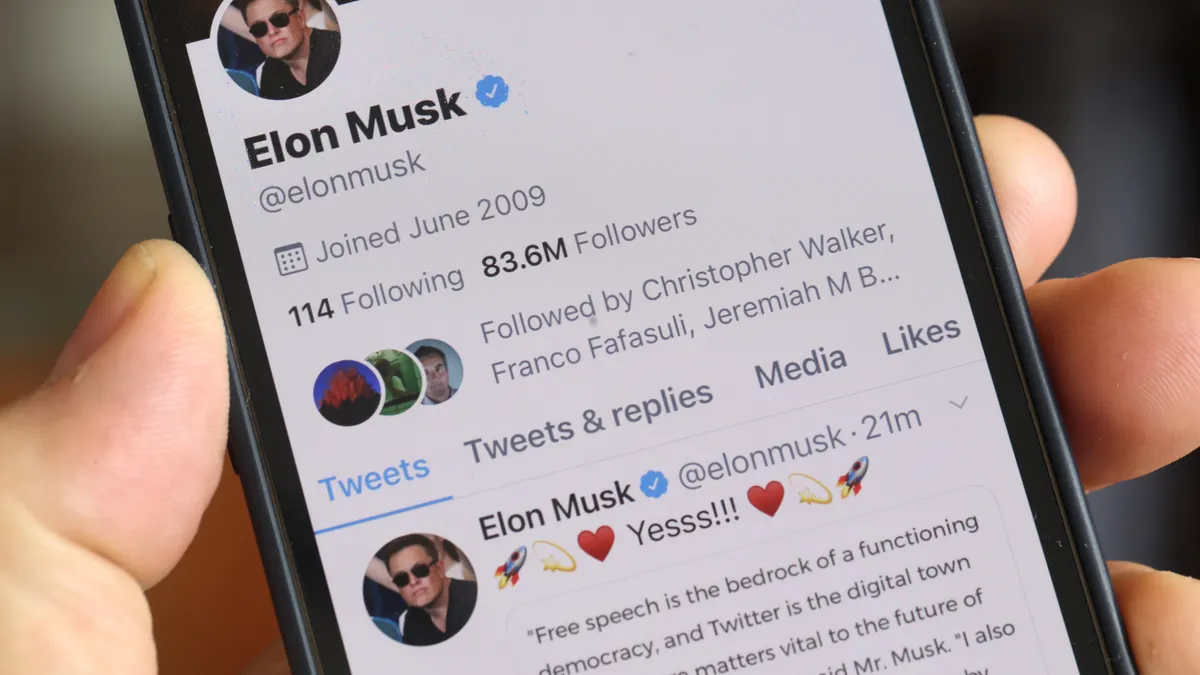Dive Brief:
-
Just days after Elon Musk formally moved to terminate his $44 billion deal to acquire Twitter, the social media company filed suit Tuesday, as expected, against Musk and two affiliated companies, asking the court to force the billionaire to close the transaction following “a long list of material contractual breaches by Musk that have cast a pall over Twitter and its business,” according to the lawsuit filed in Delaware Court of Chancery.
-
“Having mounted a public spectacle to put Twitter in play, and having proposed and then signed a seller-friendly merger agreement, Musk apparently believes that he — unlike every other party subject to Delaware contract law — is free to change his mind, trash the company, disrupt its operations, destroy stockholder value, and walk away,” the suit states.
- In addition to outlining its legal arguments for forcing Musk to close the deal, Twitter’s complaint paints a picture of senior executives under pressure as they seek to cooperate by providing information to an increasingly mercurial and adversarial buyer. It also asserts Musk advanced a “false narrative” that Twitter was “stonewalling” requests.
Dive Insight:
An attorney for Musk declined to comment on the suit Wednesday and Twitter did not respond to requests for comment.
Musk has been agitating for some time about the deal with one of his central concerns being the number of fake accounts on Twitter. A Friday letter from Musk’s attorney stating Musk was “terminating the agreement” also said Twitter appeared to be “dramatically” understating the proportion of false accounts and that Twitter had not yet provided complete information to enable Musk to do a comprehensive review of the issue. Twitter has said that the bots represent less than 5% of its accounts.
In its complaint, Twitter asserts Musk was aware that spam accounted for some portion of its daily usage when he signed the merger agreement but focused on the fake accounts as the market turned and he remained personally responsible for $33.5 billion of the $44 billion required to complete the transaction. He was grasping “for an out,” the filing states.
Twitter on June 21 gave Musk’s counsel access related to so-called “firehose” data while cautioning that it would not allow Musk to accurately assess the number of spam accounts. At the same time, Twitter CEO Parag Agrawal and Twitter CFO Ned Segal had also been trying to set up a meeting with Musk to discuss the company’s process for estimating the number of false accounts.
On June 17 Segal proposed a discussion with Musk and his team to cover the spam issue and Musk responded that he had a conflict at the suggested time, the filing states. Agrawal tried again and Musk agreed to a time on June 21 but then “bowed out” and asked Agrawal and Segal to speak with his team about pro forma financials for the debt rather than the spam issue, according to the suit.
While accusing Twitter of “lax” methodologies for calculating the accounts, Musk showed “little interest in understanding Twitter’s process,” the filing asserts. In a June 30 conversation with Segal, Musk said he had not read the detailed summary of Twitter’s sampling process, the complaint states. Segal again offered to review the process with Musk but the meeting “never occurred despite multiple attempts by Twitter.”
Twitter in its suit also rejected Musk’s lawyer’s assertion that it had breached a so-called “ordinary course” covenant under which it must keep material components of its business intact. Musk’s lawyer had said the breach was connected to the firing of two high-ranking employees and a Twitter announcement that it was laying off about a third of its recruiting staff.
Musk’s counsel was notified of the two executives being let go and raised no objection at the time and the reduction in recruiting is a small segment of Twitter’s employees, the filing states. In addition, in conversations with Agrawal and Segal throughout May and June, Musk talked about the company’s headcount being high and encouraged management to cut costs, the suit states.
“In his final conversation with Segal before purporting to terminate, Musk expressed his concern about Twitter’s expenses and asked why Twitter was not considering more aggressive cost cutting,” the complaint states.














